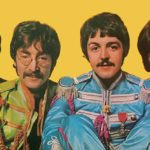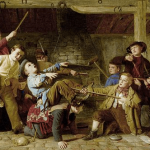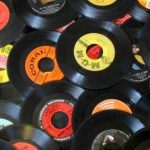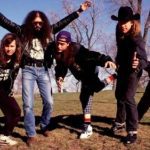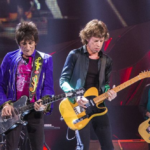 Mysteries
Mysteries  Mysteries
Mysteries  History
History 10 Surprising Stories About the Texas Rangers
 Humans
Humans 10 Philosophers Who Were Driven Mad by Their Own Theories
 Miscellaneous
Miscellaneous 10 Video-Game-Worthy Weapons and Armors from History
 Weird Stuff
Weird Stuff 10 Psychics Who Accurately Predicted Wartime Events
 The Arts
The Arts 10 Pieces of Art Inspired by a Broken Heart
 Health
Health 10 Science Fiction-Sounding New Medical Treatments
 History
History 10 Surprising Facts About the Father of Submarine Warfare
 Space
Space Ten Astonishing New Insights into Alien Worlds
 Weird Stuff
Weird Stuff 10 Bizarre Summer Solstice Rituals Still Practiced Today
 Mysteries
Mysteries Top 10 Haunting Facts About the Ghost Ship MV Alta
 History
History 10 Surprising Stories About the Texas Rangers
 Humans
Humans 10 Philosophers Who Were Driven Mad by Their Own Theories
Who's Behind Listverse?

Jamie Frater
Head Editor
Jamie founded Listverse due to an insatiable desire to share fascinating, obscure, and bizarre facts. He has been a guest speaker on numerous national radio and television stations and is a five time published author.
More About Us Miscellaneous
Miscellaneous 10 Video-Game-Worthy Weapons and Armors from History
 Weird Stuff
Weird Stuff 10 Psychics Who Accurately Predicted Wartime Events
 The Arts
The Arts 10 Pieces of Art Inspired by a Broken Heart
 Health
Health 10 Science Fiction-Sounding New Medical Treatments
 History
History 10 Surprising Facts About the Father of Submarine Warfare
 Space
Space Ten Astonishing New Insights into Alien Worlds
 Weird Stuff
Weird Stuff 10 Bizarre Summer Solstice Rituals Still Practiced Today
The Ten Best Grunge-Era Rock Songs
The grunge era of the late 20th century was one of the most memorable phases of rock music. Also known as the Seattle Sound, as many grunge bands started in Washington State, this genre was born in the ’80s and was all the rage by the early ’90s. Some of the more successful Grunge bands still make music today, while others fell into obscurity or experienced the deaths of band members and never recovered.
However, even years later, many of those songs are still popular. The grunge bands of the ’90s still sell records and merchandise and get plenty of airtime on the radio. With all this in mind, let’s look back at the ten best grunge-era rock songs.
Related: 10 Memorable Songs That Tell a Dark Story
10 “Rooster” – Alice In Chains
From their second album Dirt, “Rooster” is now considered one of the quintessential grunge songs. It spent 20 weeks on Billboard’s Mainstream Rock Tracks chart and peaked at No. 7. Vocalist/guitarist Jerry Cantrell wrote the song for his father. Jerry Cantrell, Sr.’s childhood nickname was Rooster, a name he kept while serving in the Vietnam War. An acoustic version of the song was recorded for MTV’s Unplugged and both versions appear on the 1999 box set Music Bank.
In the liner notes of the box set, Jerry Cantrell said of the song: “It was the start of the healing process between my dad and me from all that damage that Vietnam caused. This was all my perception of his experiences out there. The first time I ever heard him talk about it was when we made the video, and he did a 45-minute interview with Mark Pellington. I was amazed he did it.”[1]
9 “Black Hole Sun” – Soundgarden
Soundgarden is one of the most popular bands in rock history and a forerunner in the grunge genre. Originally formed in 1984 by frontman Chris Cornell, along with Hiro Yamamoto and Kim Thayil, the band’s first album came in 1988. While it did not sell well, it was critically acclaimed and earned a Grammy nomination in 1990. Written by Cornell, “Black Hole Sun” was released in 1994 by A&M Records as the third single from the band’s fourth studio album Superunknown.
By this time, the group was comprised of Cornell, Thayil, Matt Cameron, and Ben Shepherd. This song is Soundgarden’s greatest commercial success. Still, it also “underscores the turning point when Cornell was able to break free of his self-imposed songwriting restrictions and his constant focus on maintaining the ‘Soundgarden Sound.’”[2]
8 “Violet” – Hole
The band Hole made it big after frontwoman Courtney Love’s husband, Kurt Cobain, died. Cobain was one of the key figures in the success of the grunge movement, and many fans turned their eyes to Hole after his passing. Regardless of how they got their moment in the sun, Hole was a quintessential grunge band. “Violet” was one of their most popular songs, and it spoke deeply to women of that generation.
The song was written in mid-1991 and was performed live between 1991 and 1992 during Hole’s earlier tours, eventually appearing as the opening track on the band’s second studio album Live Through This (1994). It peaked at number 29 on Billboard’s Modern Rock Tracks after the album’s release and is considered one of Hole’s most well-known and critically recognized songs. [3]
7 “Hunger Strike” – Temple of the Dog
Temple of the Dog was a short-lived “supergroup” combining the talents of Eddie Vedder, Chris Cornell, Stone Gossard, Jeff Ament, Matt Cameron, and Mike McCready. Basically, Soundgarden meets Pearl Jam. “Hunger Strike” was the most widely successful song to come out of that experiment. There’s no saga in rock history quite like that of Temple of the Dog, the Seattle supergroup that defined grunge.
“Hunger Strike” is a direct attack on the rich and decadent. It was the last song recorded for the album; Cornell wrote it because they had only nine tracks, and he has a compulsive distaste for odd numbers. Describing the Pearl Jam Twenty collection song, he said, “I wanted to express gratitude for my life but also disdain for people where that’s not enough, where they want more. There’s no way to really have a whole lot more than you usually need without taking from somebody else that can’t afford to give it to you.”[4]
6 “Drain You” – Nirvana
Led by frontman Kurt Cobain, Nirvana was a definitive grunge band. Cobain cited “Drain You” as one of his favorite compositions, telling David Fricke in a 1993 Rolling Stone interview that he thought it was as good, if not better, than “Smells Like Teen Spirit” “I love the lyrics and never get tired of playing it,” said Cobain. The band released several versions of “Drain You,” including a live version. That version peaked at number 44 on the Radio & Records US Alternative Top 50 chart.
Originally titled “Formula,” “Drain You” was written in 1990. The song was first recorded in the spring of 1991, when Cobain and Nirvana drummer Dave Grohl visited Melvins drummer Dale Crover and his then-girlfriend Debbi Shane in San Francisco, California. It became the eighth track from their album Nevermind and one of the most memorable grunge songs ever recorded.[5]
5 “Plush” – Stone Temple Pilots
“Plush” was released as the second single from the band’s 1992 debut studio album Core in August 1993. It became their first single to top the U.S. Billboard Album Rock Tracks chart and became that listing’s number-one song of 1993. Stone Temple Pilots was one of the most popular bands of the grunge era and one of the few that didn’t come from the Seattle area. The band formed in San Diego in 1989 and was hugely successful through two albums.
Frontman Scott Weiland was plagued with substance abuse issues and was in and out of jail until he passed away in 2015 at the age of 48. With its many possible interpretations, fans and musicologists often propose their own theories. Many tie it to Weiland’s own addiction issues, while others relate it to a mental breakdown. Other possible meanings include “a broken love story, a senseless tragedy, or a mystery left unsolved.”[6]
4 “Alive” – Pearl Jam
Pearl Jam was and is undoubtedly the most successful band to emerge from the grunge era, and “Alive” helped put them on the map. It was the band’s first single from their debut album Ten. The song was only available through import in the United States, so it could not chart on the Billboard Hot 100. However, “Alive” is number 16 in the United Kingdom and nine in Australia.
In August 2018, it became the first Pearl Jam song to receive a certification from the British Phonographic Industry (BPI). It eventually received a gold certification in July 2022 for sales and streams of over 400,000. The song is a semi-autobiographical account that reflects Eddie Vedder’s own childhood experience of being told the truth about his real father. It has become a grunge anthem.[7]
3 “Jane Says” – Jane’s Addiction
Jane’s Addiction broke up in 1991, the beginning of the grunge era, but their Generation X anthem, “Jane Says,” is considered one of the first grunge hits. It was released in 1987, becoming the band’s first chart entry on the Alternative Songs chart, peaking at #6. The band made its name before the grunge era, but the L.A. band played a major role in ’90s music thanks to vocalist Perry Ferrell’s founding of Lollapalooza. The legendary music festival allowed many grunge bands to reach fans throughout the country for years.
The band has reunited several times over the years and released a live version of the song, adding steel drums. Today, the “tune is associated with grunge, a genre that has faded in sales but contributed to a handful of radio staples. Alternative rock stations love ‘classic grunge’ songs,” such as “Jane Says.”[8]
2 “Smells Like Teen Spirit” – Nirvana
Undoubtedly, Nirvana’s biggest hit, “Smells Like Teen Spirit,” is an iconic grunge song and one of the most successful songs of all time. It is the opening track and lead single from the band’s second album Nevermind (1991), released on DGC Records. The song was wildly successful, more so than anyone would have expected. It brought massive mainstream attention to the group. While that attention eventually brought success, the small band grew uncomfortable with it.
Thirty years after Kurt Cobain’s death, the song still gets regular airplay on radio stations across North America. “Smells Like Teen Spirit” is an essential Generation X anthem and perhaps the most iconic grunge song. A little-known fact about the title: While it’s not mentioned within the lyrics, the phrase refers to a night of drinking at Kurt’s apartment in Olympia, Washington. His friend Kathleen penned the immortal line “Kurt smells like Teen Spirit” on his wall.[9]
1 “Jeremy” – Pearl Jam
Pearl Jam’s first album Ten is full of grunge classics. “Jeremy,” potentially the most successful, tells the story of a troubled young man. The song and the video were both critically acclaimed and won multiple awards. It left the image of “Jeremy” as a school shooter emblazoned on the track forever and led to the song being one of the most misconstrued in rock history, with most casual fans believing the song is about a school shooting murder and not a suicide.
The song was inspired by a newspaper article lyricist Eddie Vedder read about Jeremy Wade Delle, a high school student who shot himself in front of his English class on January 8, 1991. It reached the number 5 spot on the Album and Modern Rock Billboard charts. The song hasn’t gotten much airtime in recent decades, largely due to its controversial content. Still, there is no better example of a grunge song than “Jeremy.”[10]

